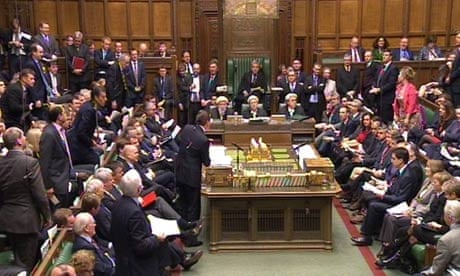Plans for MPs to job share in parliament are being developed by the Liberal Democrats in an effort to increase the number of women elected and break up the male "presenteeism culture" that still dominates politics.
The idea is to be put to the Lib Dem spring conference next month as all three main parties struggle to find ways to increase female representation in parliament.
On Monday David Cameron admitted during a visit to India that there were not nearly enough Conservative women MPs and too few women in the cabinet, and revealed that his wife, Samantha, was pressing him to do more to open up his party.
He did not come up with any practical solutions. Many in his party fear that there will be fewer Tory MPs after the next election than at present because many women elected last time are in some of the most vulnerable seats.
The proposals for MP job shares comes in a wider paper on political reform prepared for the Lib Dem conference by its federal executive policy-making committee.
Earlier in the year a private members' bill in parliament called for job shares but failed to make progress. The Lib Dems insist they would not be imposing job-sharing MPs on constituents. Instead "job-share candidates would stand on a joint ticket and voters would choose whether or not to vote for them in the same way they decide whether or not to vote for any other candidate", the report says.
"If elected, agreed protocols around voting, serving on select committees and other MPs' duties would bind the job-share candidates."
The paper says: "The rationale behind the proposal is that it could open up the role of MP to a much wider group of people than at present. Research shows that one of the main barriers to increasing women's participation in politics is perceived incompatibility with family life, while evidence from professions such as medicine, law and the senior civil service suggests that provision for part-time working significantly increases the talent pool of women progressing into senior roles."
Ministers should also be free to share their portfolio with another MP from their party, the paper says. The idea raises issues such as whether the job-share MPs would vote consistently or develop a coherent line of argument.
The paper points out that currently in the Commons men outnumber women four to one. The Lib Dems lag behind the other major UK political parties. The party in the Commons comprises just 12% women (down from 15% in the previous parliament). There are currently no minority ethnic Lib Dem MPs.
The paper concludes that the party urgently needs a distinctive policy.
A Speaker's Conference in January 2010 looked at the issue of female under-representation in parliament but failed to galvanise radical change.
The report identified the problem of "pervasive systemic barriers to political participation by under-represented groups, including: cost, time and resource barriers facing would-be activists and candidates from under-represented groups, presenteeist cultures and inflexible working practices in political parties and institutions, including constituency expectations, Commons sitting hours, absence of parental leave".
The Lib Dem report claims "academic evidence is unambiguous: internationally, the only countries to have achieved equality of representation have done so through statutory equality guarantees".
Cameron disclosed his wife had pressed him to do more on women in public life. He said "My wife likes to say that if you don't have women in the top places, you are not just missing out on 50% of the talent, you are missing out on a lot more than 50% of the talent – and I think she probably has a point," he said.
He added: "We still have a long way to go. If you look at the top businesses in Britain, there still aren't nearly enough women in the boardroom. If you look at politics in Britain, there aren't nearly enough women around the cabinet table."
And he said the Tory party had only 19 women MPs before the last election: "We have around 50 now. We have made a big change, but it is only 50 out of 300, so it's not nearly enough, so we need to do more."

Comments (…)
Sign in or create your Guardian account to join the discussion